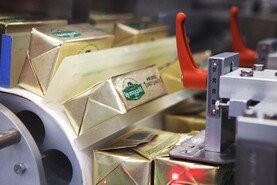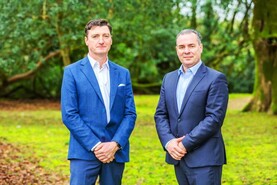The future viability of the global dairy ingredients industry is at risk due to the emergence of new technologies, according to one of New Zealand’s leading dairy executives.
Speaking at Dairy Day 2019, Dr John Penno, the co-founder of infant formula company Synlait, said he worries about the impact of new technologies capable of creating alternative dairy ingredients and what they mean for the future of the established dairy ingredients sector.
Penno gave the example of Perfect Day ice cream, a California-based company which has developed a technology that can make casein (a dairy protein) from fermented yeast.
“I’m not too worried about where these technologies are at the moment, but I am pretty worried about where they might go into the future,” said Penno.
“I think this is a technology we really need to watch in the animal industry – particularly on the ingredients side of things. You could see a collapse in the dairy based ingredients industry over the next 10 to 20 years,” he said.
Penno (right) pointed to the claims that these new dairy alternatives can make around the manufacture of ingredients.
Perfect Day claims its casein requires 65% less energy to manufacture, 98% less water, 91% less land use and emits 84% less greenhouse gas (GHG) than traditional dairy production.
“We have to take them into account as we plan our future investments and where we [dairy farmers] position ourselves. I think that dairy has to move away from ingredients,” said Penno.
“If these new technologies have the same functionality as dairy ingredients like casein, whey powders, milk powder and other dairy proteins then I think they will be a big threat for the dairy ingredients sector. That’s the market these companies will target first,” he said.
Penno warned that the days of the dairy industry supplying dairy-based ingredients and milk powders to food manufacturers to make biscuits, baked goods and other food products could be in jeopardy.
“If these products are better and cheaper they’ll find their way into the ingredients space and that will work back to supply and demand in dairy markets.
“So I think the threat is very real and it’s moving very quickly.”
Value chain
When asked where he thought the future of the Irish dairy industry lies, Penno said the industry had a choice.
“Ireland’s dairy industry can continue to add as much value as possible to the milk that you already produce or you can continue to grow in size. If you continue to grow you have to make sure you consider very carefully where that extra milk is going to go,” said Penno.
“If that milk is going into milk powders or dairy ingredients-based strategies, I think Ireland really needs to start thinking through what you will do if those markets become devalued due to dairy alternatives. Don’t be allured by the idea that China is going to continue to import huge amounts of dairy into the future.
“What has been really good for the last 15 years isn’t going to define the next 15 years,” he added.
Great story
Penno said the Kerrygold story was a brilliant brand where genuine premiums are being delivered for farmers, but questioned the value of Ireland’s infant formula industry to the primary producer.
“You’ve got a great story in Kerrygold. The important thing about Kerrygold is that farmers are participating in the whole value chain. For me, you need to start doubling down on it and think about how you grow that brand into the future,” he said.
“I’ve heard a lot about Ireland producing 15% of the world’s infant formula. But the question is how well are farmers participating in that value chain?
“Are you really participating in the value of the infant formula market or are you just commodity producers of dairy ingredients that are required by that industry,” said Penno.
What is Synlait?
Founded in 2007, Synlait is a New Zealand dairy processor that manufactures finished infant formula products for global multinationals such as Danone, Nestlé and Mead Johnson. The company had sales of NZ$1bn (€595m) last year and made profits of NZ$127m (€72m). Synlait produced almost 43,000t of infant formula last year and 107,000t of milk powders and cream. The company is listed on the New Zealand stock market and is currently valued at NZ$1.8bn (€1.05bn).






 This is a subscriber-only article
This is a subscriber-only article









SHARING OPTIONS: